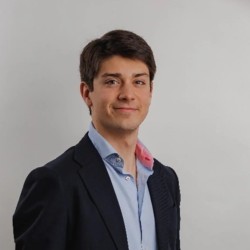
Joao Miguel
Surrey’s strong connections with employers and reputation for graduate employability made it the ideal place to build a practical foundation for my career.
Course
Economics BSc (Hons)Graduation year
2022Placement company
Government’s Department for Environment, Food and Rural Affairs (Defra)Can you give us a brief summary of your career to date?
At 25, I currently serve as Lead Adviser to the Secretary of State for the Economy in the Portuguese Government, one of the youngest appointments in the country’s history. I work directly with the Minister for the Economy and the Prime Minister, advising on national economic policy and leading cross-ministerial initiatives in areas such as industry, infrastructure, energy, artificial intelligence, entrepreneurship, and defence. I’ve helped shape major legislation and coordinated strategic measures like the Green Reindustrialisation Plan and the national response to US tariffs.
Before joining government, I progressed quickly at McKinsey & Company, leading projects across Europe and Latin America in the energy and industrial sectors. I supported the launch of a €1Bn lithium refinery, defined the global strategy for a €1.3Bn clean-tech manufacturer, and co-founded the Iberian Industry and Energy Transition Initiative, a coalition bringing together leaders from Iberdrola, EDP, Repsol, and BBVA, whose proposals were presented at the World Economic Forum in Davos and discussed with EU Vice President Teresa Ribera.
Earlier in my career, I served in the UK Government Economic Service, advising on climate regulation, Net Zero strategy, and economic policy for DEFRA. At 21, I was appointed Youth National Leader for a Portuguese presidential candidate.
I hold an MSc in Finance from London Business School and a first-class degree in Economics from the University of Surrey, where I was Valedictorian. Throughout, my career has been driven by a commitment to public purpose and the belief that leadership and impact transcend age.
How did your time at Surrey help you to decide which career to go into?
One of the main reasons I chose Surrey was its Professional Training placement programme, which I saw as a defining part of my university experience. Surrey’s strong connections with employers and reputation for graduate employability made it the ideal place to build a practical foundation for my career.
During my placement year, I worked as an Economic Adviser in the UK Government’s Department for Environment, Food and Rural Affairs (Defra). It was my first real exposure to public service, advising ministers on climate regulation and net-zero policy, and it completely changed how I saw the impact economists can have on society. That experience made me realise that shaping policy was where I could contribute most meaningfully.
Today, as Adviser to the Secretary of State for the Economy of Portugal, I still see that year as the moment that set the foundation for everything that followed.
What advice would you give to Surrey students hoping to work in your profession?
My advice to Surrey students interested in government is to see public service not just as a career, but as a contribution. Roles in government are about shaping decisions that affect millions of people, and that responsibility requires both technical skill and a deep sense of purpose.
Surrey was where I built the foundations for that path. The placement year was transformative: it opened my eyes to the impact economists and policymakers can have in improving lives. I’d encourage students to take every opportunity for practical exposure, whether through placements, research projects, or internships, because real-world experience in public institutions teaches you how policy is shaped, negotiated, and implemented.
Equally important is developing a broad skill set. Working in government demands the analytical rigour of an economist, the structured thinking of a consultant, and the empathy of a public servant. Every subject, case study, and team project at Surrey can help you strengthen one of those dimensions.
Finally, stay curious and connected. Engage with mentors, professors, and alumni who’ve worked in public policy. These conversations will help you understand the diversity of roles within government and clarify where you can make the most meaningful contribution.
Public service is demanding, but it’s also deeply rewarding.
Please tell us briefly about your work placement and how you think it had an impact on your career development?
For my Professional Training placement, I worked as an Economic Adviser at the UK Government’s Department for Environment, Food and Rural Affairs (Defra). I joined the Analysis and Evidence team for Floods and Climate Change, working alongside economists, scientists, and social researchers to advise ministers on climate policy and infrastructure investment.
That year was a turning point. It was my first experience in public service and showed me how rigorous analysis can drive national policy. It strengthened my technical skills, shaped my sense of purpose, and ultimately set the foundation for my career, now as Adviser to the Secretary of State for the Economy of Portugal.
What is your happiest memory of your time at Surrey?
I think my best moments at University have normally involved socialising with friends who I will keep for life. My advice to anyone thinking of applying to Surrey is to go for it! You will meet like-minded people, get a great education and have good job prospects when you leave.
What were the best things about your course?
The strongest feature of the course was the calibre of the teaching. We were taught by academics who were not only research-active, but also involved in advising international institutions. That gave the degree a credibility and a real-time relevance, you weren’t learning an abstract model, you were seeing how that model travels into central bank memos, IMF briefings or regulatory design. It trained us to think like economists with skin in the game, not like spectators.
A second strength was the deliberate focus on employability and applied competence. The placement year, combined with a curriculum that forces you to write code, interrogate data and defend assumptions, meant you graduated with muscles not just marks. It was a course that made you do economics, not merely talk about it.
Finally, the culture of the department mattered. It was a small, international, high-trust community where students’ views genuinely shaped delivery. The atmosphere was demanding but supportive: you were expected to have a view, to defend it, and to adapt it in the face of evidence. That combination of intellectual seriousness and pastoral support built confidence and maturity fast.
What attracted you to choose the University of Surrey?
I chose Surrey above other offers because of its Professional Training placement. A placement year was non-negotiable for me, and Surrey’s scheme had a reputation for being embedded in the business community rather than being a paper exercise. The university’s consistently strong position in graduate employability rankings reinforced the sense that the degree would translate into real options afterwards, not just academic credit.
The visit confirmed that judgement. The campus felt deliberately designed for students - compact, walkable and self-contained, with accommodation, study space and teaching all close by - but still with generous green space and modern facilities. It looked like a place where you could live, work and focus without friction.
Why do you think prospective students should choose to study at Surrey?
Surrey combines strong academic rigour with practical, career-focused opportunities. Its Professional Training placement programme is exceptional, giving students real-world experience that can define a career path. The University’s close ties with employers, supportive faculty, and extensive alumni network make it an ideal environment to build both skills and confidence. Beyond that, Surrey fosters a collaborative and high-energy culture, which mirrors the environments graduates often enter, whether in consulting, government, or industry.
Finally, what is your advice to new students to help them make the most of their time at Surrey?
Take full advantage of placements, clubs, and alumni networks. Engage actively with projects, competitions, and mentorship opportunities, these experiences teach you practical skills, help you discover your interests, and build connections that matter. Be curious, proactive, and open to challenges; the more you invest in your time at Surrey, the greater the foundation it provides for your future career.
Discover more about our Economics programmes.

